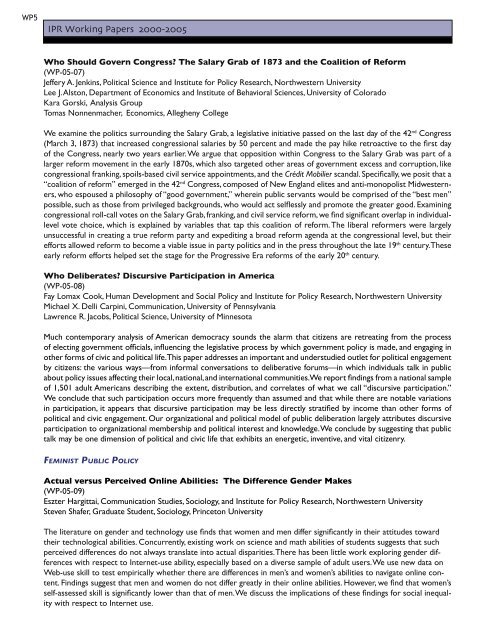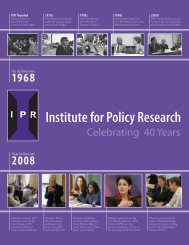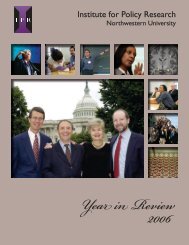Whatever Happened to the Emerging Democratic Majority?
Whatever Happened to the Emerging Democratic Majority?
Whatever Happened to the Emerging Democratic Majority?
Create successful ePaper yourself
Turn your PDF publications into a flip-book with our unique Google optimized e-Paper software.
WP5<br />
IPR Working Papers 2000-2005<br />
Who Should Govern Congress? The Salary Grab of 1873 and <strong>the</strong> Coalition of Reform<br />
(WP-05-07)<br />
Jeffery A. Jenkins, Political Science and Institute for Policy Research, Northwestern University<br />
Lee J. Als<strong>to</strong>n, Department of Economics and Institute of Behavioral Sciences, University of Colorado<br />
Kara Gorski, Analysis Group<br />
Tomas Nonnenmacher, Economics, Allegheny College<br />
We examine <strong>the</strong> politics surrounding <strong>the</strong> Salary Grab, a legislative initiative passed on <strong>the</strong> last day of <strong>the</strong> 42 nd Congress<br />
(March 3, 1873) that increased congressional salaries by 50 percent and made <strong>the</strong> pay hike retroactive <strong>to</strong> <strong>the</strong> first day<br />
of <strong>the</strong> Congress, nearly two years earlier. We argue that opposition within Congress <strong>to</strong> <strong>the</strong> Salary Grab was part of a<br />
larger reform movement in <strong>the</strong> early 1870s, which also targeted o<strong>the</strong>r areas of government excess and corruption, like<br />
congressional franking, spoils-based civil service appointments, and <strong>the</strong> Crédit Mobilier scandal. Specifically, we posit that a<br />
“coalition of reform” emerged in <strong>the</strong> 42 nd Congress, composed of New England elites and anti-monopolist Midwesterners,<br />
who espoused a philosophy of “good government,” wherein public servants would be comprised of <strong>the</strong> “best men”<br />
possible, such as those from privileged backgrounds, who would act selflessly and promote <strong>the</strong> greater good. Examining<br />
congressional roll-call votes on <strong>the</strong> Salary Grab, franking, and civil service reform, we find significant overlap in individuallevel<br />
vote choice, which is explained by variables that tap this coalition of reform. The liberal reformers were largely<br />
unsuccessful in creating a true reform party and expediting a broad reform agenda at <strong>the</strong> congressional level, but <strong>the</strong>ir<br />
efforts allowed reform <strong>to</strong> become a viable issue in party politics and in <strong>the</strong> press throughout <strong>the</strong> late 19 th century. These<br />
early reform efforts helped set <strong>the</strong> stage for <strong>the</strong> Progressive Era reforms of <strong>the</strong> early 20 th century.<br />
Who Deliberates? Discursive Participation in America<br />
(WP-05-08)<br />
Fay Lomax Cook, Human Development and Social Policy and Institute for Policy Research, Northwestern University<br />
Michael X. Delli Carpini, Communication, University of Pennsylvania<br />
Lawrence R. Jacobs, Political Science, University of Minnesota<br />
Much contemporary analysis of American democracy sounds <strong>the</strong> alarm that citizens are retreating from <strong>the</strong> process<br />
of electing government officials, influencing <strong>the</strong> legislative process by which government policy is made, and engaging in<br />
o<strong>the</strong>r forms of civic and political life. This paper addresses an important and understudied outlet for political engagement<br />
by citizens: <strong>the</strong> various ways—from informal conversations <strong>to</strong> deliberative forums—in which individuals talk in public<br />
about policy issues affecting <strong>the</strong>ir local, national, and international communities. We report findings from a national sample<br />
of 1,501 adult Americans describing <strong>the</strong> extent, distribution, and correlates of what we call “discursive participation.”<br />
We conclude that such participation occurs more frequently than assumed and that while <strong>the</strong>re are notable variations<br />
in participation, it appears that discursive participation may be less directly stratified by income than o<strong>the</strong>r forms of<br />
political and civic engagement. Our organizational and political model of public deliberation largely attributes discursive<br />
participation <strong>to</strong> organizational membership and political interest and knowledge. We conclude by suggesting that public<br />
talk may be one dimension of political and civic life that exhibits an energetic, inventive, and vital citizenry.<br />
Feminist Public Policy<br />
Actual versus Perceived Online Abilities: The Difference Gender Makes<br />
(WP-05-09)<br />
Eszter Hargittai, Communication Studies, Sociology, and Institute for Policy Research, Northwestern University<br />
Steven Shafer, Graduate Student, Sociology, Prince<strong>to</strong>n University<br />
The literature on gender and technology use finds that women and men differ significantly in <strong>the</strong>ir attitudes <strong>to</strong>ward<br />
<strong>the</strong>ir technological abilities. Concurrently, existing work on science and math abilities of students suggests that such<br />
perceived differences do not always translate in<strong>to</strong> actual disparities. There has been little work exploring gender differences<br />
with respect <strong>to</strong> Internet-use ability, especially based on a diverse sample of adult users. We use new data on<br />
Web-use skill <strong>to</strong> test empirically whe<strong>the</strong>r <strong>the</strong>re are differences in men’s and women’s abilities <strong>to</strong> navigate online content.<br />
Findings suggest that men and women do not differ greatly in <strong>the</strong>ir online abilities. However, we find that women’s<br />
self-assessed skill is significantly lower than that of men. We discuss <strong>the</strong> implications of <strong>the</strong>se findings for social inequality<br />
with respect <strong>to</strong> Internet use.
















